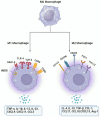Epigenetic Mechanisms Induced by Mycobacterium tuberculosis to Promote Its Survival in the Host
- PMID: 39519352
- PMCID: PMC11546203
- DOI: 10.3390/ijms252111801
Epigenetic Mechanisms Induced by Mycobacterium tuberculosis to Promote Its Survival in the Host
Abstract
Tuberculosis caused by the obligate intracellular pathogen, Mycobacterium tuberculosis, is one among the prime causes of death worldwide. An urgent remedy against tuberculosis is of paramount importance in the current scenario. However, the complex nature of this appalling disease contributes to the limitations of existing medications. The quest for better treatment approaches is driving the research in the field of host epigenomics forward in context with tuberculosis. The interplay between various host epigenetic factors and the pathogen is under investigation. A comprehensive understanding of how Mycobacterium tuberculosis orchestrates such epigenetic factors and favors its survival within the host is in increasing demand. The modifications beneficial to the pathogen are reversible and possess the potential to be better targets for various therapeutic approaches. The mechanisms, including histone modifications, DNA methylation, and miRNA modification, are being explored for their impact on pathogenesis. In this article, we are deciphering the role of mycobacterial epigenetic regulators on various strategies like cytokine expression, macrophage polarization, autophagy, and apoptosis, along with a glimpse of the potential of host-directed therapies.
Keywords: apoptosis; autophagy; epigenetics; macrophage polarization; miRNA modification; tuberculosis.
Conflict of interest statement
The authors declare that the research was conducted in the absence of any commercial or financial relationships that could be construed as a potential conflict of interest.
Figures
References
Publication types
MeSH terms
Substances
LinkOut - more resources
Full Text Sources
Medical



